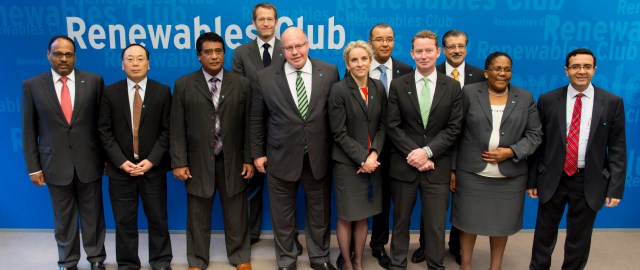In a recent (and unfortunately undated) paper, the WRI points out that the world is not on track to slow down global warming and proposes a solution: a new club of nations, whose members would work together. There would be strict requirements for membership as well, as Craig Morris explains.

The recently established Renewables Club during their first meeting in Berlin. Does just another forum for dialogue help, though? (BMU/Ute Grabowsky, photothek.net)
How many international, or at least transnational, organizations focusing on renewables can you think of? Eurosolar immediately comes to my mind; it celebrated its 25th anniversary last month. Then there is the World Council for Renewable Energy (WCRE). If I remember correctly (I attended the conference at which the Council was founded), it was created in 2001 partly with the aim of setting up an international renewable energy agency to compete with the International Energy Agency. Instead, Ren21 was created when German Environmental Minister Jürgen Trittin got his way over parliamentarian Hermann Scheer, who was pushing for what eventually became IRENA.
That’s four organizations already, three of which were largely created by the late Scheer, with the other practically being created against him. And we haven’t even gotten to a slew of other organizations, such as the International Solar Energy Society (ISES), which is even older than all the rest. And the founding of clubs continues; only last June, Germany founded a Renewables Club with 10 other members.
“The clubs analyzed included the IEA Multilateral Technology Initiatives (Implementing Agreements), the G8, the G20, the Renewable Energy & Energy Efficiency Partnership (REEEP), the Carbon Sequestration Leadership Forum (CSLF), REN 21, the Asia-Pacific Partnership on Clean Development and Climate (APP), the Global Bioenergy Partnership, the Major Economies Forum on Energy and Climate (MEF) and its predecessor the Major Economies Meeting on Energy Security and Climate Change (MEM), the Clean Energy Ministerial (CEM), the REDD + Partnership, the Global Methane Initiative (GMI), the Global Green Growth Institute (GGGI), the International Partnership on Mitigation and MRV, the Low Emissions Development Strategies (LEDS) Global Partnership, the International Energy and Climate Initiative – Energy+, and the Climate and Clean Air Coalition to Reduce Short-Lived Climate Pollutants (CCAC).”
Footnote 12 from the study
Clearly, there is no dearth of organizations promoting renewables. But as the WRI writes, the new Renewables Club does not fulfill the criteria for effectiveness as defined in the study. And the problem is clearly stated in the first sentence: “The world is currently not on track to avoid dangerous climate change.” The study takes a look at 17 existing clubs devoted to climate change and finds that they are all either “dialogue forums” or “implementation groups,” whereas what is needed is “leadership clubs or transformational clubs.”
As the list of clubs analyzed in the text box above shows, the WRI only covers one of the organizations I mention above (Ren21, though IRENA is also mentioned). Instead, the WRI focuses on the UNFCCC system, which it says encourages the formation of such clubs. I do not have the competence to comment on the UN system, so see the study for yourself if you are interested in the details.
The WRI says Germany could play a leading role in such a club, though it is endangering its leadership position in light of the recent increase in carbon emissions. And the study says that existing clubs, such as the recently formed Renewables Club, can become the kind of club called for if developed along the lines described in the study.
In addition to membership criteria, the club would have to take account of “political realities,” including for membership. Interestingly, one criterion would be a 100% renewables target for electricity by 2050, which (though the authors do not acknowledge the fact) would exclude Germany, whose target is 80% green power by midcentury.
Most of all, the WRI says that, while the name Solar Economy Club is not mandatory, it clearly focuses on renewables, unlike such labels as “low-carbon” and “green growth” (and the authors also mention that the term Solar Economy comes from Hermann Scheer). Specifically, the new club would focus on replacing fossil and nuclear energy with renewables not only for electricity, but also for heat and motor fuels.
In my next post, I take a look at the specific policy proposals the study would like a new Renewables Club to promote.
Craig Morris (@PPchef) is the lead author of German Energy Transition. He directs Petite Planète and writes every workday for Renewables International.